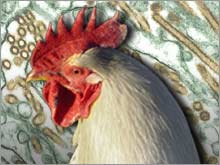Iomai CEO: Patch could boost bird flu vaccineExperimental skin patch would allow government to stretch expected vaccine stockpile tenfold: CEO.NEW YORK (CNNMoney.com) -- Iomai Corp. is developing a skin patch meant to give a broad boost to what is expected to be a national stockpile of bird flu vaccines, the biotech company's CEO said Monday. Iomai (up $0.00 to $6.01, Charts) chief executive Stanley Erck said his company's experimental patch seemed to boost the strength of vaccines under development when used in conjunction with them. Erck said that his patch, if successful, would allow the government to stretch vaccine stockpiles tenfold in the event of a bird flu pandemic.  "It allows you to expand the effective vaccine stockpile almost overnight," Erck said at the Biotechnology Industry Organization's conference of CEOs and investors in New York on Monday. "Effectively, a 100-million dose supply becomes 1 billion." Erck said the vaccine patch has already been tested in 3,000 people and is ready to enter human trials. The federal government sees potential in the Iomai patch in controlling the outbreak of bird flu and other viruses. On Jan. 17, the Department of Health and Human Services awarded a $128 million contract to the biotech to fund studies and continued testing the patch so it can be submitted for review by the Food and Drug Administration. Also on Jan. 17, the HHS awarded a $63 million contract to British drugmaker GlaxoSmithKline (up $0.42 to $58.20, Charts) to develop a vaccine for bird flu, and a $55 million contract to Novartis to develop an addition to strengthen existing vaccines. With the patch technology, Erck said his Maryland-based company plans to avoid supply problems like the ones that hit Chiron in 2004, when it failed to deliver half of the flu vaccine ordered by the U.S. government that year. (Chiron has since been purchased by the Swiss drug company Novartis (down $0.84 to $58.40, Charts).) Bird flu virus, or H5N1, has decimated poultry flocks in Asia and Europe and has killed at least 160 people, most of them in Vietnam and Indonesia, according to the World Health Organization, but the virus is still rare in humans. The virus spreads among birds and from birds to humans, but has not spread from human-to-human except in very limited circumstances. Government officials and scientific experts fear that if the virus mutates into a form that can be easily transmitted among humans, it could be similar to the influenza pandemic of 1918, which killed 40 million to 50 million people. Other biotech companies are developing ways to improve vaccines to better prepare the nation against the possible threat of a pandemic. Una Ryan, chief executive of Avant Immunotherapeutics, Inc. (up $0.01 to $1.40, Charts) in Needham, Mass., said at the BIO conference that her company partnered with the Austrian company Select Vaccines on Monday to develop a new type vaccine that would produce stronger immune responses than more traditional vaccines, said Ryan. Larry Smith, vice president of vaccine research for San Diego-based Vical Incorp. (down $0.26 to $5.86, Charts) and Michael Ostrach, chief executive of Dynavax Pharmaceuticals (down $0.09 to $5.51, Charts) in Berkeley, Calif., said their companies were developing vaccines with broad applications, to try and vaccinate patients against entire flu families, rather than specific flu strains. |
Sponsors
|
